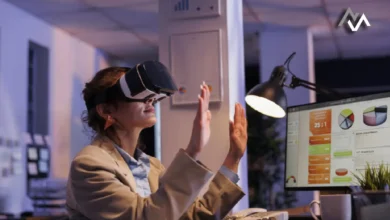AI in the Enterprise: What to Expect by 2025

As we move closer to 2025, artificial intelligence (AI) continues to evolve at a remarkable pace. Its integration into the enterprise landscape is reshaping business operations, from enhancing customer experiences to optimizing internal processes. Businesses of all sizes are increasingly relying on AI to drive innovation, improve efficiency, and stay competitive in a rapidly changing market. In this article, we explore the key trends and advancements expected in AI for the enterprise by 2025 and how organizations can harness its potential for growth and success.
1. AI as a Core Business Strategy
By 2025, AI will no longer be viewed as a supplementary technology but as a central element of enterprise strategy. Companies will integrate AI at the heart of their decision-making processes, utilizing it to automate tasks, improve data analytics, and predict future trends. The use of AI to make data-driven decisions will help enterprises remain agile and responsive to market demands. As AI becomes an integral part of the organizational structure, the role of Chief AI Officers (CAOs) will gain prominence, ensuring that AI initiatives align with business objectives.
2. AI-Powered Automation Across Industries
One of the most significant shifts by 2025 will be the widespread adoption of AI-powered automation. Enterprises will deploy AI to streamline repetitive and mundane tasks, freeing up employees to focus on more strategic activities. Industries such as manufacturing, finance, and healthcare are expected to benefit greatly from AI automation, reducing operational costs and improving productivity. For instance, AI-driven robots and smart machines will enhance precision in manufacturing, while intelligent chatbots will provide personalized customer service in retail.
Moreover, AI will empower organizations to manage complex data processes more efficiently. With AI tools like Natural Language Processing (NLP) and Machine Learning (ML), enterprises will process vast amounts of unstructured data, extracting valuable insights that can drive business decisions.
3. Personalized Customer Experiences with AI
Customer experience will undergo a significant transformation by 2025, thanks to AI’s ability to deliver personalized interactions. AI will enable companies to analyze customer behavior and preferences in real-time, offering tailored solutions, recommendations, and services. For instance, in the retail sector, AI-powered systems will suggest products based on individual shopping habits and browsing history, increasing conversion rates and customer satisfaction.
Additionally, AI-driven customer service platforms will offer instant, 24/7 support across multiple channels. Chatbots and virtual assistants will handle a wide range of customer inquiries, ensuring a seamless, on-demand service experience. The ability to anticipate customer needs before they arise will create a deeper sense of trust and loyalty.
4. Ethics and AI Governance in the Enterprise
As AI becomes more integrated into business operations, questions regarding ethics and governance will take center stage. By 2025, enterprises will need to prioritize ethical considerations in their AI strategies, ensuring that their systems are transparent, accountable, and free from bias. This includes developing frameworks for AI governance that address issues such as data privacy, algorithmic fairness, and responsible AI deployment.
The rise of AI ethics committees and regulatory bodies will help ensure that AI technology is used for the greater good, preventing potential misuse and ensuring that it benefits both businesses and society at large. With a growing focus on fairness and transparency, organizations that implement ethical AI practices will gain a competitive edge and build trust with customers and partners.
5. AI-Driven Innovation and Product Development
AI will play a pivotal role in accelerating innovation by 2025. From designing cutting-edge products to optimizing services, AI will help companies develop new solutions faster and more efficiently. Enterprises will leverage AI to simulate and test product prototypes, making design processes more iterative and reducing time-to-market.
Furthermore, AI will assist in identifying emerging market trends and customer needs, helping companies stay ahead of the competition. With advanced predictive analytics, AI will give businesses a clearer understanding of future market dynamics, enabling them to adapt their strategies accordingly.
6. AI and Human Collaboration: The Future of Work
As AI continues to evolve, its role in the workplace will shift from automation to collaboration. Rather than replacing human workers, AI will act as a powerful tool to enhance their abilities. By 2025, AI will assist employees in performing tasks more efficiently and creatively, leading to a more productive and satisfied workforce.
For example, in knowledge-based industries like law and finance, AI will handle data-heavy tasks such as document review, allowing professionals to focus on high-level strategic decision-making. In creative fields like marketing and advertising, AI will help generate data-backed insights that inform campaign strategies, while still allowing humans to bring their creative vision to life.
Conclusion: Embracing the AI Revolution
As we look toward 2025, it’s clear that AI will be a game-changer for enterprises across the globe. Its ability to enhance efficiency, drive innovation, and improve customer experiences will reshape industries in ways we’ve only begun to imagine. However, businesses must approach AI adoption with a well-defined strategy, balancing automation with ethical considerations to ensure long-term success.
By embracing AI as a core component of their operations, enterprises can unlock new opportunities, navigate complex challenges, and remain competitive in an increasingly digital world.




